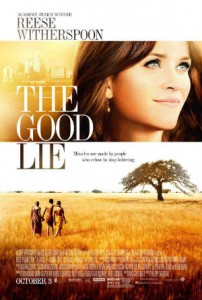 Starring: Arnold Oceng, Ger Duany, Emmanuel Jal and Reese Witherspoon
Starring: Arnold Oceng, Ger Duany, Emmanuel Jal and Reese Witherspoon
Directed By: Philippe Falardeau
Rated: PG-13
Running Time: 110 minutes
Warner Bros.
Our Score: 3 out of 5 stars
In a movie like this, the number one question to ask yourself is, “How much does this movie care about the people it’s portraying?” It’s a very legitimate question that has plenty of factors. The director of “The Good Lie” has a soft visual touch to the difficult issue of the second Sudanese civil war. Writer Margaret Nagle has handled the lives of others in her works, near and dear to her heart, so she doesn’t harm their image. And most importantly, some of the actors and actresses have lived through this kind of experience. So why can’t this movie outgrow its ABC Family TV movie feeling?
Mamere (Oceng), Jeremiah (Duany), Paul (Jal) and Abital (Kuoth Wiel) are happily headed to America after spending years in a Kenyan refugee camp. 13 years prior to that, they had to flee their Sudanese village after it was torched to the ground and their parents were slaughtered in front of them. In their nearly 500 mile trek to safety, they lose friends to starvation, watch other refugees get gunned down and Mamere watches soldiers take his older brother Theo. Mamere has to persevere and become the leader of hope for the group.
The first half hour is a bit harrowing since it pulls no punches through unnerving scenes of lifeless bodies floating in the river and our group having to bury one of their friends in the unforgiving wasteland. Even after all those hardships and helping one another through it, they can’t live together in America. The three men learn that their sister Abital can’t go with them to Kansas City. She has to go to Boston because rules require separating the men and women. Then the tone of the movie does a complete 180 when the trio arrives in cowtown.
While it’s a necessity that we need some humorous culture shocks to add relief to the horrors we just watched, they really seem to heap it on in a slightly dehumanizing fashion that borders on making fun of our group. It’s a bit light hearted to see them react suspiciously to jello, but I would hope it’s not the filmmaker’s intention for us to laugh at them being uncomfortable in their living situations and moving their mattresses into the living room so they can spend their first night in a new country together. Then if that wasn’t enough, the product placement is very blatant and repugnant. Consider the context of one scene where one of them becomes carsick because they’ve never been in a vehicle and have airplane food swishing back and forth in their bowels. What’s the cure? McDonalds. I’ll just leave it at that.
Miraculously it stops itself short of being completely off putting by introducing Carrie (Witherspoon) who instead of giggling at their misfortunes, is there to help them find jobs and seems genuinely concerned about their predicament. She doesn’t get a lot of on-screen time even though the poster for this movie would tell you otherwise. The real emotional draw for this movie is the refugees, but it doesn’t know where to go with them. Mamere wants to be a doctor and is probably the most driven of all of them. Jeremiah even quits a job because he morally doesn’t agree with what his boss has him do. Paul for some reason takes the advice of people he doesn’t know or has any real connection to, and starts smoking pot. It’s almost as if someone didn’t feel confident enough with the men trying to find normalcy after escaping a war torn area theme powerful enough and began shoehorning in another angles and characters.
I commend the actors for portraying something that’s very near and dear to their heart with such honest passion. When they’re on screen spilling their heart out, “The Good Lie” succeeds and nearly redeems its poorer qualities. Despite my complaints, I find it somewhat miraculous that the final moments are still a powerful message about good will. “The Good Lie” is a crowd pleaser, albeit one that is far from knocking it’s touching story out of the park.

